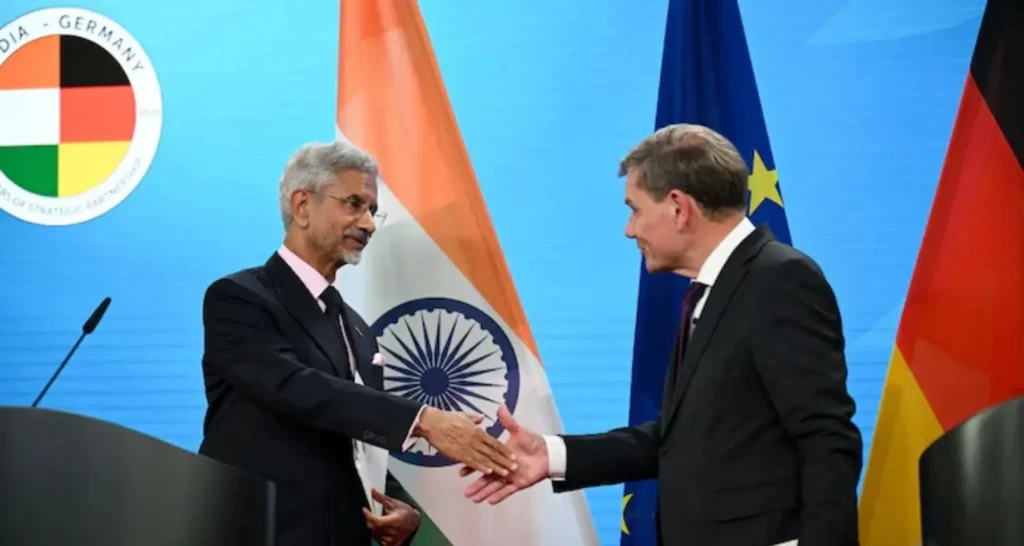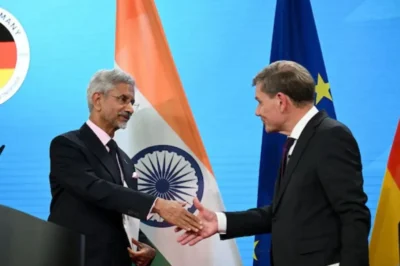
In a significant diplomatic development, Indian External Affairs Minister S. Jaishankar lauded Germany’s prompt and unequivocal support for India’s right to defend itself against terrorism. Speaking at the German Council on Foreign Relations in Berlin, Jaishankar emphasized that Germany’s early condemnation of the recent Pahalgam terror attack and its recognition of India’s self-defence rights were commendable. He noted that such support was crucial in the global fight against terrorism and underscored the importance of international solidarity in addressing this menace.
Germany’s Stance on India’s Right to Self-Defence
Jaishankar highlighted that Germany’s support was not just rhetorical but grounded in a shared understanding of international norms. He pointed out that Germany’s Deputy Foreign Minister, Johann Wadephul, had reiterated Germany’s recognition of India’s right to defend itself, both during their meeting in New Delhi and in subsequent statements. This alignment reflects a deepening of the strategic partnership between India and Germany, particularly in the realm of counter-terrorism cooperation.
The Pahalgam Terror Attack: A Broader Strategy
The Pahalgam terror attack, which occurred earlier this year, was described by Jaishankar as part of a broader strategy to destabilize India. He explained that the attack aimed to create a fear psychosis, disrupt the tourism economy in Kashmir, and sow religious discord. Jaishankar emphasized that such acts were not isolated incidents but part of a deliberate effort to undermine India’s sovereignty and internal stability.
India’s Response: Operation Sindoor
In response to the Pahalgam attack, India launched Operation Sindoor, a targeted military operation against terrorist infrastructure. Jaishankar clarified that the operation was a direct response to terrorism and was conducted with international understanding. He stated that the targets were terrorist headquarters and sites, and the operation was not aimed at any nation but at eliminating terrorist threats emanating from across the border.
Cross-Border Terrorism: A Persistent Challenge
Jaishankar reiterated that cross-border terrorism remained a persistent challenge for India, with neighbouring countries continuing to use terrorism as a tool of statecraft. He emphasized that while India sought peaceful relations with its neighbours, it would not tolerate acts of terrorism and would take necessary measures to safeguard its citizens and sovereignty.
Strengthening India-Germany Strategic Partnership
Marking 25 years of strategic partnership between India and Germany, Jaishankar outlined future areas of cooperation. He identified defence and security as key sectors where both countries could collaborate more closely. Jaishankar noted that there was a realization in both nations about the mutual benefits of enhanced cooperation in these areas, especially in the context of global security challenges.
Broader Global Cooperation: India-EU Relations
Beyond bilateral ties, Jaishankar emphasized the importance of strengthening India-EU relations. He noted that the global security landscape was increasingly complex, and enhanced cooperation between India and Germany, as well as with the broader European Union, was essential. Jaishankar highlighted that the partnership between India and Germany had acquired greater importance and salience in recent years, reflecting shared values and common interests in global stability.
Conclusion: A Unified Stand Against Terrorism
In conclusion, Jaishankar’s remarks underscored a unified stand between India and Germany against terrorism and for the right to self-defence. The diplomatic engagement highlighted the growing convergence between the two nations on critical global issues and set the stage for deeper cooperation in the future. As both countries continue to navigate the complexities of international relations, their partnership stands as a testament to the power of shared values and mutual respect in addressing global challenges.








































Leave a Reply